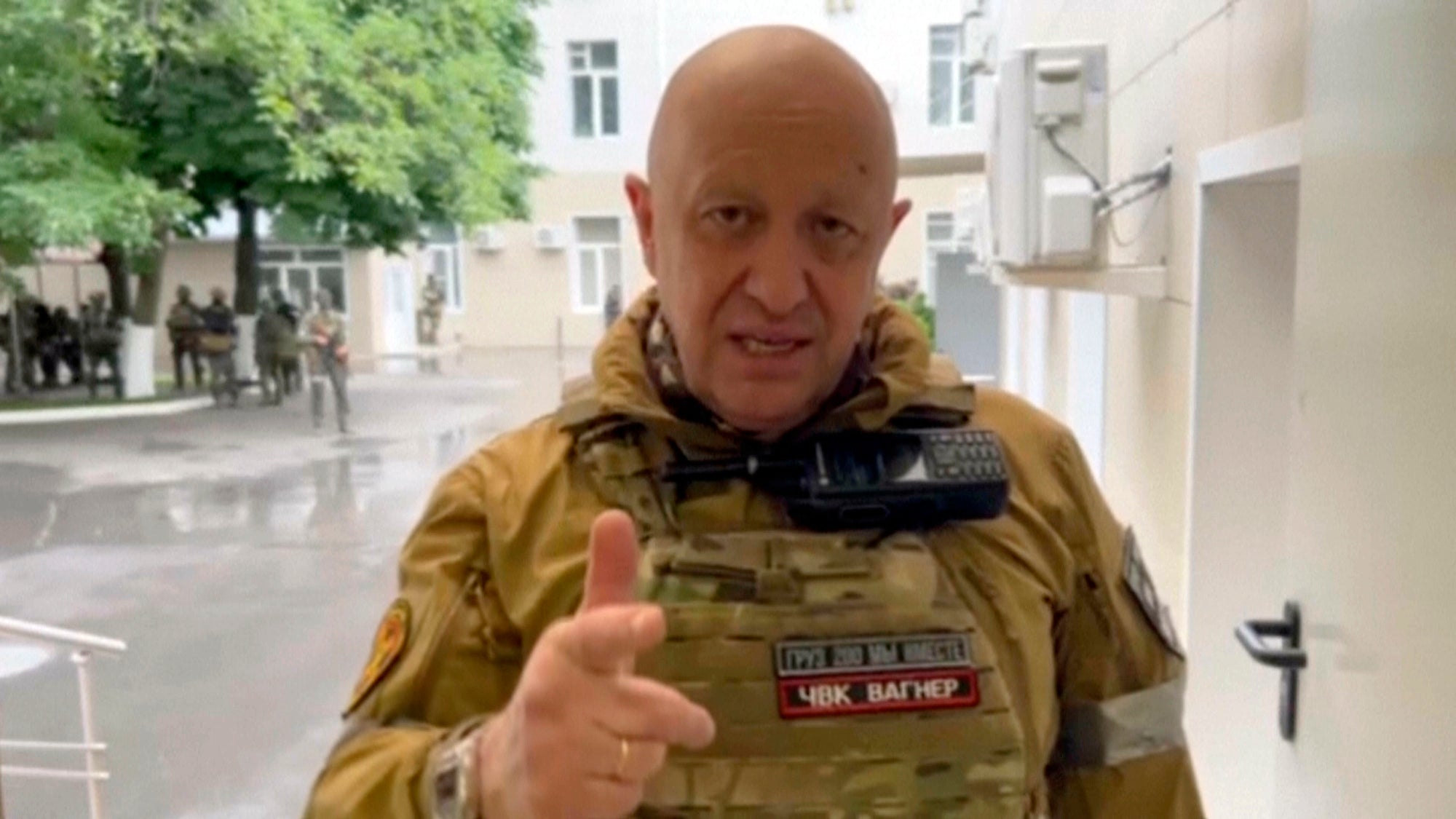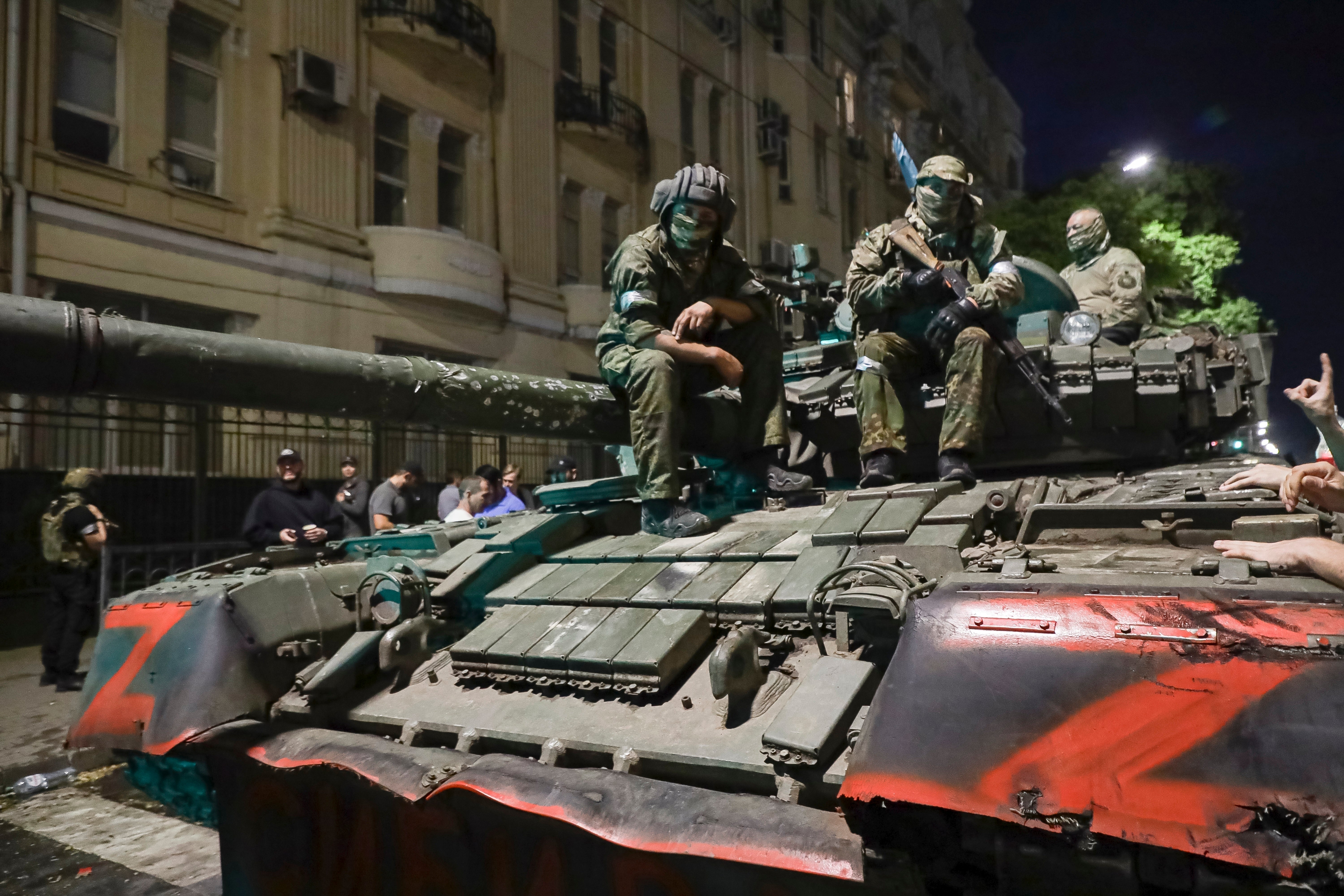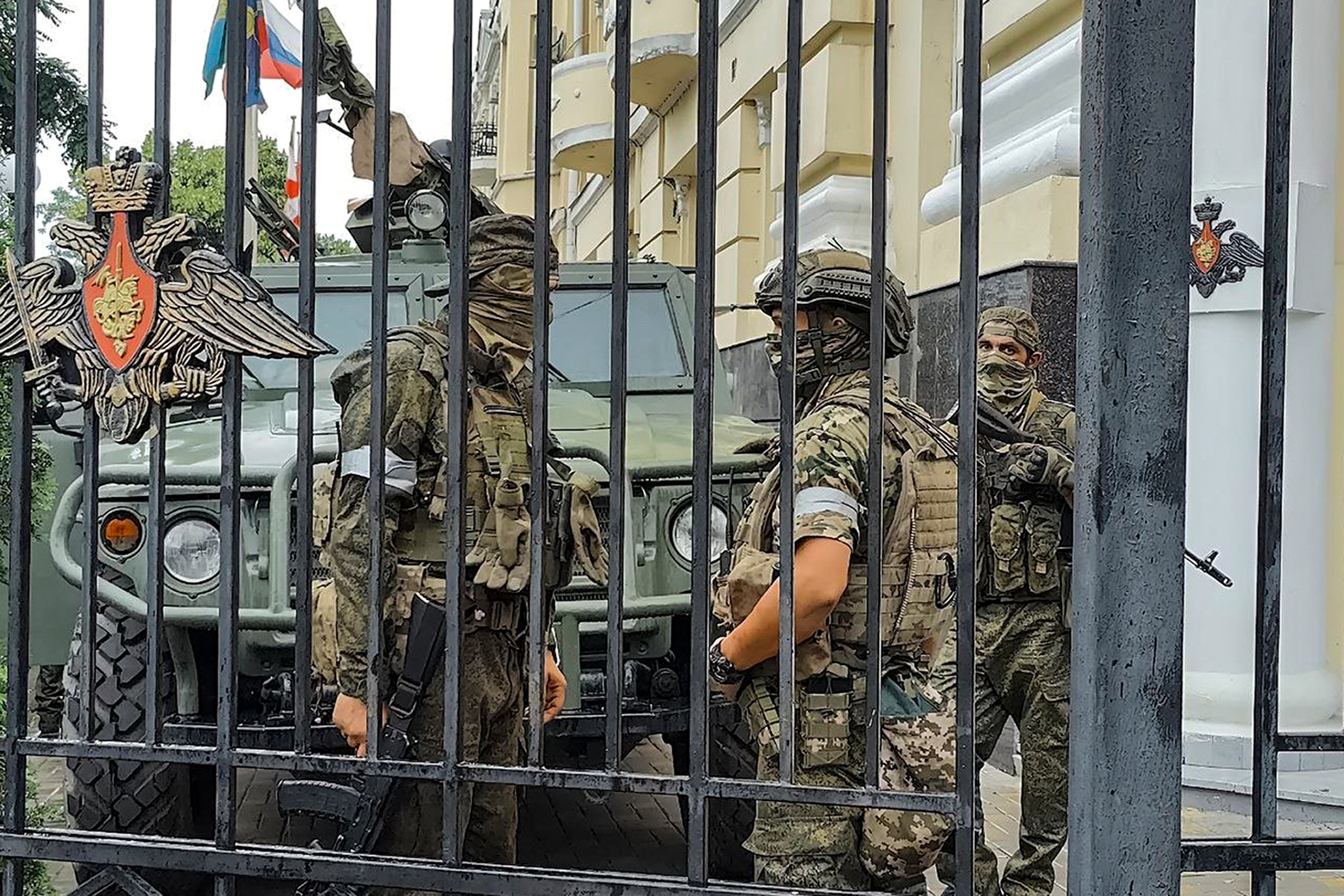How the Wagner Group’s armed uprising almost toppled Vladimir Putin
For 36 hours, Russian president appeared to be on the brink as Yevgeny Prigozhin’s mercenary fighters left frontline in Ukraine to occupy Rostov-on-Don and march on Moscow
Your support helps us to tell the story
From reproductive rights to climate change to Big Tech, The Independent is on the ground when the story is developing. Whether it's investigating the financials of Elon Musk's pro-Trump PAC or producing our latest documentary, 'The A Word', which shines a light on the American women fighting for reproductive rights, we know how important it is to parse out the facts from the messaging.
At such a critical moment in US history, we need reporters on the ground. Your donation allows us to keep sending journalists to speak to both sides of the story.
The Independent is trusted by Americans across the entire political spectrum. And unlike many other quality news outlets, we choose not to lock Americans out of our reporting and analysis with paywalls. We believe quality journalism should be available to everyone, paid for by those who can afford it.
Your support makes all the difference.Three weeks on from the extraordinary mutiny staged by the Russian paramilitary organisation the Wagner Group, which threatened to bring down Vladimir Putin, details are continuing to emerge about precisely how it was averted.
The armed uprising saw the group’s mercenaries leave their posts in eastern Ukraine on Friday 23 June to cross into Russia and occupy the western city of Rostov-on-Don before engaging in what their leader, Yevgeny Prigozhin, called a “march for justice” on Moscow to demand the removal of Russia’s top military officials Sergei Shoigu and Valery Gerasimov in protest at their botched handling of the Ukraine invasion.
Mr Prigozhin, 62, had complained for months that his men had been left without sufficient resources as they fought to secure the town of Bakhmut over the hard winter months, frequently taking to Telegram to record messages denouncing the insufficient supplies of ammunition his forces had received from the Defence Ministry.
With things looking black for Mr Putin by the Saturday evening as a Wagner column approached the Russian capital, the standoff was abruptly ended after Belarussian president Alexander Lukashenko, a long-time ally of Mr Putin, stepped in to help broker a deal between the two sides, wherein Mr Prigozhin agreed to relocate to Belarus and for his forces to stand down.
It has since emerged that the Wagner leader never arrived in Minsk and is believed to have remained in Russia, adding to the air of confusion surrounding the affair.
On Monday, presidential spokesman Dmitry Peskov let it be known for the first time that Mr Putin and Mr Prigozhin had actually met in person at the Kremlin on Thursday 29 June, five days after the incident, for a three-hour meeting, attended by 35 people, including senior Wagner commanders who reiterated their loyalty to their leader.
Here is a brief timeline mapping out how the coup-that-wasn’t unfolded while the world held its breath.
Friday 23 June
Yevgeny Prigozhin – Wagner’s leader, a former convict turned restaurant impresario known as “Putin’s chef” – complains in a social media message that Russian troops had deliberately shelled his forces on the battlefield earlier that day with rockets, helicopter gunships and artillery, “killing huge numbers of our comrades”, in the interest of wiping out the increasingly unruly contractor.
He trails what is to come by declaring: “There are 25,000 of us and we are coming to sort things out... Those who want to join us, it’s time to finish with this mess.”
Saturday 24 June
1am
Vladimir Putin is awoken in the Kremlin and informed of an “attempted armed rebellion” underway, according to state media.
Dmitry Peskov issues a statement reporting the Wagner Group’s move into Rostov-on-Don near the Ukraine border, pointedly referring to it as a “rebellion” rather than a coup.
7.30am
Mr Prigozhin announces in another social media message that his men have taken control of Rostov’s military buildings.
“We will destroy anyone who stands in our way,” he states, adding: “We are moving forward and will go until the end.”
This appears to signal Wagner’s intentions to march on Moscow.

His forces stand guard outside of the Southern Military District’s headquarters in Rostov while others patrol the streets.
Local residents come outside to observe the situation. Some take photographs with the fighters or bring them food while others condemn their conduct.
Russian media meanwhile reports that several helicopters and a military communications plane were downed by Wagner troops, although this is not confirmed by the Kremlin.
9.30am
The UK’s Ministry of Defence reports that the “feud” between Wagner and the Russian Defence Ministry has “escalated into outright military confrontation” and notes that the former’s forces had begun to move north “almost certainly aiming to get to Moscow”.
It added: “With very limited evidence of fighting between Wagner and Russian security forces, some have likely remained passive, acquiescing to Wagner.

“Over the coming hours, the loyalty of Russia’s security forces, and especially the Russian National Guard, will be key to how the crisis plays out.
“This represents the most significant challenge to the Russian state in recent times.”
10am
Wasting little time in attempting to reassert his authority, a visibly angry Mr Putin delivers an address on national television in which he denounces Wagner’s actions as “treason” and characterises their leader’s conduct as a “stab in the back”, bitterly declining to utter his name and comparing the morning’s events to the revolution of 1917.
“This is a criminal campaign. It is equivalent to armed mutiny,” Mr Putin fumes.
“Russia will defend itself and repel this move. We are fighting for the life and security of our citizens and our territorial integrity.
“In the face of those who are fighting on the front, this is a stab in the back of the troops and the people of Russia.”

He adds: “Those who mutiny have betrayed Russia and I urge anybody involved in it to cease any kind of participation in armed conflict.
“These people will be brought to justice on behalf of our people.”
Ramzan Kadyrov, regional leader of Chechnya, states his support for Mr Putin and says his own forces are already moving towards “zones of tension”. Few others join him in making an unambiguous commitment to Mr Putin personally.
Confusion subsequently reigns about Mr Putin’s whereabouts, after it is reported he had left Moscow by plane, which is swiftly denied by the Kremlin.
11am
Mykhailo Podolyak, an adviser to Ukrainian president Volodymyr Zelensky, describes the silence of Russia’s elites as “deafening” and tweets: “The next 48 hours will define the new status of Russia.
“Either a full-fledged Civil War, or a negotiated Transit of Power, or a temporary respite before the next phase of the downfall of the Putin regime.”
Mr Zelensky himself later takes to the same platform to say: “Russia used propaganda to mask its weakness and the stupidity of its government. And now there is so much chaos that no lie can hide it.”

5pm
A convoy of Wagner forces passes through Voronezh and later Lipetsk en route to Moscow as Russia’s scrambled armed forces prepare for a “counter terrorism operation” by erecting checkpoints with armoured vehicles and placing National Guardsmen on the capital’s southern outskirts, braced to defend it.
Construction crews meanwhile dig up sections of highways to slow the march while Moscow’s mayor, Sergei Sobyanin, urges city residents to stay indoors and not to attend work on the coming Monday.
8pm
Almost as suddenly as it began, the Wagner mobilisation ends, as Mr Prigozhin unexpectedly orders his men to stand down and return to their field camps, saying he has no wish to “shed Russian blood”.
They are just 120 miles south of Moscow when they receive the order to halt.
It emerges that a deal has been struck with Mr Putin, under the terms of which the revolt’s leader will relocate to Belarus, never to return to Russia.
Wagner fighters who took part will not be prosecuted, Russia says, while those who did not would be offered contracts with the regular Russian army.

Sunday 25 June
President Zelensky says during his daily address to the people of Ukraine that Mr Putin is “obviously very afraid” and is “probably hiding”, while his defence minister Oleksii Reznikov says the 36-hour mutiny shows the Russian authorities are “weak”.
Tuesday 27 June
Three days later, once the dust has settled, Russia’s Federal Security Services announces that it has officially dropped its criminal case against Yevgeny Prigozhin and the Wagner fighters.
Thursday 29 June
As we now know, Mr Putin and Mr Prigozhin met at the Kremlin on this date, sitting down with 35 other senior military personnel to discuss the episode. Precisely what was said or what conclusions were reached remains unknown.
On the same day, it is reported by The Moscow Times that Sergei Surovikin, nicknamed “General Armageddon” for his brutal exploits in Syria, has been arrested after being accused of having advanced knowledge of the rebellion and of siding with Mr Prigozhin.
Thursday 6 July
Mr Lukashenko, not always the most reliable of witnesses, speaks publicly for the first time about the talks he helped mediate between Mr Putin and Mr Prigozhin on the evening of 24 June to avert calamity for Russia.

In so doing, he reveals that the Wagner leader has not yet made his way to Minsk, raising questions about his exact whereabouts and the true nature of the agreement forged to end the standoff.
“As for Yevgeny Prigozhin, he is in St Petersburg. Where is he this morning? Maybe he went to Moscow in the morning,” he said.
Asked by reporters if the Kremlin knows of Mr Prigozhin’s current location, Mr Peskov answers, somewhat surprisingly: “No, we do not follow his movements, we have neither the ability nor the desire to do so.”
On the same day, Russian TV channel Izvestia runs footage of a raid carried out on Mr Prigozhin’s palatial apartment in St Petersburg, showcasing bizarre finds including a collection of wigs and a stuffed alligator alongside bars of gold bullion, multiple passports, weapons and ammunition as part of a clear bid to discredit him.
Monday 10 July
Mr Peskov first reveals the face-to-face meeting held between the two sides five days after the failed uprising, a further reminder that the international community is still a long way from fully understanding the factors in play.
A video is released showing General Gerasimov hearing a report from the chief of staff of Russia’s aerospace forces and calling for improvement in identifying the location of Ukrainian missiles, the first time he has been seen going about his duties since the uprising.






Join our commenting forum
Join thought-provoking conversations, follow other Independent readers and see their replies
Comments